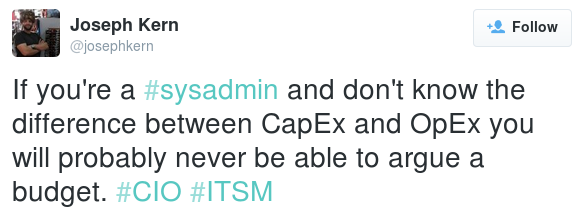Joseph Kern posted this gem to Twitter yesterday.

It's one of those things I never thought about since I kind of instinctively learned what it is, but I'm sure there are those out there who don't know the difference between a Capital Expenditure and an Operational Expenditure, and what that means when it comes time to convince the fiduciary Powers That Be to fork over money to upgrade/install something that there is a crying need for.
Capital Expenditures
In short, these are (usually) one-time payments for things you buy once:
- Server hardware.
- Large storage arrays.
- Perpetual licenses.
- HVAC units.
- UPS systems (but not batteries, see below).
Operational Expenditure
These are things that come with an ongoing cost of some kind. Could be monthly, could be annual.
- Your AWS bill.
- The Power Company bill for your datacenter.
- Salaries and benefits for staff.
- Consumables for your hardware (UPS batteries, disk-drives)
- Support contract costs.
- Annual renewal licenses.
Savy vendors have figured out a fundamental truth to budgeting:
OpEx ends up in the 'base-budget' and doesn't have to be justified every year, so is easier to sell.
CapEx has to be fought for every time you go to the well.
This is part of why perpetual licenses are going away.
But you, the sysadmin with a major problem on your hands, have found a solution for it. It is expensive, which means you need to get approval before you go buy it. It is very important that you know how your organization views these two expense categories. Once you know that, you can vet solutions for their likelihood of acceptance by cost-sensitive upper management. Different companies handle things differently.
Take a scrappy, bootstrapped startup. This is a company that does not have a deep bank-account, likely lives month to month on revenue, and a few bad months in a row can be really bad news. This is a company that is very sensitive to costs right now. Large purchases can be planned for and saved for (just like you do with cars). Increases in OpEx can make a month in the black become one in the red, and we all know what happens after too many red months. For companies like these, pitch towards CapEx. A few very good months means more cash, cash that can be spread on infrastructure upgrades.
Take a VC fueled startup. They have a large pile of money somewhere and are living off of it until they can reach profitability. Stable OpEx means calculating runway is easier, something investors and prospective employees like to know. Increased non-people CapEx means more assets to dissolve when the startup goes bust (as most do). OpEx (that AWS bill) is an easier pitch.
Take a civil-service job much like one of my old ones. This is big and plugged into the public finance system. CapEx costs over a certain line go before review (or worse, an RFC process), and really big ones may have to go before law-makers for approval. Departmental budget managers know many ways to... massage... things to get projects approved with minimal overhead. One of those ways is increasing OpEx, which becomes part of the annually approved budget. OpEx is treated differently than CapEx, and is often a lot easier to get approved... so long as costs are predictable 12 months in advance.